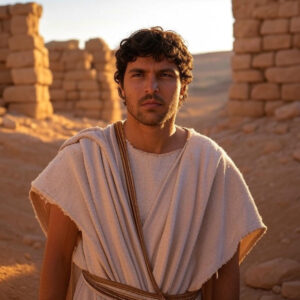Seldom do we find someone in history with as many characteristics of a true believer, leader, and family man as we do in the one man Joshua. Here was a man for all seasons, a man we would do well to call our model.
do we find someone in history with as many characteristics of a true believer, leader, and family man as we do in the one man Joshua. Here was a man for all seasons, a man we would do well to call our model.
Throughout Scripture it appears that Joshua always remained in the shadow of his great teacher, Moses. Yet Joshua can truly stand alone as one of Israel’s greatest leaders in so many different ways!
Although we usually think of Joshua as a mighty warrior who led the Israelites in the famous battle of Jericho, we would do well to look first at his humble beginnings. Unlike Moses, we know little of Joshua’s birth or childhood. He was from the tribe of Ephraim, the son of Nun. As with all young men at that time, his future was pretty well decided since he was one of thousands of young Hebrews who lived as slaves in the land of Goshen. Joshua never forgot the pain he suffered by the whip of his oppressors, nor did he forget the Egyptian idols and godless living he witnessed among the Egyptians. In Joshua’s touching farewell address, he mentioned the Egyptians nine times. “Now fear the Lord and serve him with all faithfulness. Throw away the gods your forefathers worshiped beyond the River and in Egypt, and serve the Lord” (24:14).
Joshua was also a spy. When the children of Israel were preparing to enter the Promised Land, Joshua was chosen as one of the 12 spies sent to search out Canaan. Only he and Caleb gave a faith-filled report, saying that God would surely give them the land. Their words were not heeded, and God’s anger condemned his people to 40 years of wandering in the desert. As Moses made preparations for his own death, he passed the mantle of leadership to Joshua, a man greatly trusted and respected.
Joshua served as Israel’s leader during some of their most difficult times. It was Joshua who led the Israelites over the Jordan River into the land of milk and honey. It was Joshua who gave the order for the Israelites to charge into Jericho. It was Joshua who divided up the land and gave the marching orders to destroy the heathen enemy. Joshua always knew that success depended entirely on the Israelites’ faithfulness to the Lord’s promises.
Joshua’s faith in the Savior was clearly seen in his farewell speech. At age 110, Joshua was one of only two people among all the Israelites who still remembered life in Egypt. Only he and Caleb witnessed each plague, watched the Red Sea part, and lived to see the Jordan River do the same. Joshua’s body was old and worn, but his mind was clear and his memory sharp. That=s why he said what he did. That’s why he knew who was still in charge. “Choose for yourselves this day whom you will serve, . . . but as for me and my household, we will serve the Lord” (24:15).
Even after a life of public service, Joshua’s last prayer was for his family, those closest to him, those he loved most. We can appreciate what Joshua was thinking. He knew it was critical to one day see his children and future generations of all God’s people ushered into the gates of heaven. This was a prayer he carried with him throughout his life.
It is also the duty of each of us to first teach our households about the love, faithfulness, forgiveness, and hope we have in the promises of God. Joshua said it well: “Now I am about to go the way of all the earth. You know with all your heart and soul that not one of all the good promises the Lord your God gave you has failed. Every promise has been fulfilled; not one has failed” (23:14). We could learn a few lessons from Joshua, the slave, spy, soldier, servant, statesman, and SAINT!
Though all the world forsake Thy Word, I and my house will serve the Lord. Amen.
